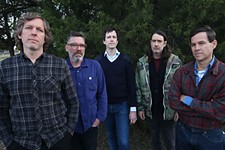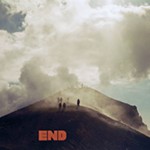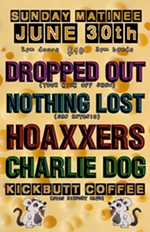Swampadelic
7 Walkers rise from the Dead
By Austin Powell, Fri., Nov. 26, 2010

Grateful Dead drummer Bill Kreutzmann and Austin's godfather of funk Malcolm "Papa Mali" Welbourne share the same zodiac designate: Taurus, the second astrological sign, a bull-shaped constellation visible in winter and supposedly ruled by the planet Venus.
That's not a rare occurrence; roughly two of every 150 people share a similar fate. Yet, both artists mention the fact in separate interviews, conducted days apart. It's as if they're seeking some sort of supernatural explanation for the mystical otherness of 7 Walkers, their new project with legendary Meters bassist George Porter Jr. and local keyboardist/producer/multi-instrumentalist and all-around MVP Matt Hubbard.
Make no mistake. The band's new self-titled debut comes as a cosmic revelation, full of amulet charms and shadow rhythms, unfolding with the patience and confidence normally reserved for a veteran band at its pinnacle. Boasting contributions from Grateful Dead lyricist Robert Hunter, 7 Walkers bears that band's distinct stamp, though more in spirit than in sound.
"It's a whole other groove," stresses Kreutzmann.
"We want to invoke the ethos of what the Dead embodied, a band that was steeped in all aspects of Americana, from Reverend Gary Davis to Obray Ramsey, but from our perspective, more blues than bluegrass," adds Welbourne. "People are excited to see something from the Dead that's not a cover band. I've never been one of those guys that has posters of Jerry [Garcia] on my wall or tries to play like him, and that's one of the reasons why this works."
Kreutzmann refers to the music of 7 Walkers as "swampadelic," a natural meeting point between his West Coast psychedelia and Welbourne's voodoo-funk. Theirs is a saga of friendship and good fortune, set in the bayou but firmly entrenched in Austin.
Hunter summed it up best to Kreutzmann in an e-mail after hearing the initial demos: "Sounds like you might have found the magic again."
Anthem of the Sun
I feel the pain of others, a blessing and a curse
Got the means to heal, citing chapter book and verse
– "7 Walkers"
In the long, strange history of the Grateful Dead, Kreutzmann literally never skipped a beat. Known as one-half of the group's spiraling Rhythm Devils, he co-founded the infamous jam band and played its first show at one of Ken Kesey's Acid Tests in December 1965. He missed not one of an estimated 2,300 live performances that followed.
"If I didn't show up, they couldn't play," laughs Kreutzmann, 64, from a hotel in Hermosa Beach, Calif., humbled by the simplicity of the statistic. "It was a matter of pride, too. I didn't want to be the missing link."
When the Dead was buried along with its guiding light and guitarist Jerry Garcia in August 1995, Kreutzmann retreated to Hawaii, producing an environmental documentary, Ocean Spirit, and focusing on his work as a visual artist – anything to take his mind off the void. The drummer tried his hand at several projects, most notably Backbone, a one-off blues collaboration with guitarist Rick Barnett, and toured with Dead offshoot the Other Ones at the turn of the century. He later founded the Rhythm Devils with his three-decade partner in percussion, Mickey Hart, and jazz trio BK3. The former even featured new songs penned by Hunter.
"But there wasn't much holding my interest musically," he clarifies.
That changed at the 2008 Oregon Country Fair. The annual counterculture arts exhibition has maintained a loose affiliation with the Merry Pranksters and the Dead since hosting a benefit concert for the Springfield Creamery, a yogurt company owned by Kesey's family, in 1972. At the behest of his girlfriend, Kreutzmann caught Welbourne's set and was so taken that he introduced himself afterward. The two were inseparable the rest of the weekend.
"That Sunday we closed the fair down," boasts the Palo Alto, Calif., native. "We played from midnight to 4 in the morning, until they finally told us to be quiet so that they could pack out. We've gotten along famously since then."
That camaraderie was plainly evident at the 2009 Austin City Limits Music Festival, where the two held court backstage with the merriment of old friends. Not even the Saturday afternoon downpour dampened their enthusiasm as they essentially laid out the blueprint for 7 Walkers – juke-joint blues, creole funk, and South Austin Americana interwoven with the Grateful Dead canon – during Papa Mali's set on the Austin Ventures stage, closing with a stirring revision of "Friend of the Devil."
"Papa is such an amazing talent," enthuses Kreutzmann with a tinge of paternal pride. "Everything he touches is musical. He's very reminiscent of Jerry in that way, and it's so refreshing to play with someone like that again, because the energy and the creativity involved is just boundless.
"When we were back in our practice studio in California, Jerry would play with his guitar and sing, and you could just tell from that exactly what you should do to complement the song. I get the same feeling from Papa. He'll frame Bob's lyrics in a way that really holds the picture properly, and I'll know where I'm supposed to take it from there."
Thunder Chicken
Roll away from sorrow, roll away from pain
Make myself a home among the gators and the rain
– "Louisiana Rain"
Papa Mali dwells above the garage of Malcolm Welbourne's cozy residence near Lake Travis, a portal into the inner psyche of his Night Tripper alter ego. Decorated with an assortment of voodoo sticks and Mardi Gras relics, the room could pass as an emporium of vintage keyboards and guitars, including a 1961 Stratocaster once used by Hubert Sumlin and a Les Paul given to him by its namesake creator.
Hundreds of vinyl records from every genre and decade – only a third of his collection – line the entrance alongside framed photos of Elvis Costello, Clifford Antone, and Ray Benson, while a Taj Mahal show poster and a "Leon Russell Lifer" sticker claim the wall by the studio console. A box of newly acquired Dead bootlegs and old master tapes of his longtime band the Killer Bees beckon further inspection.
The downstairs kitchen seems a world apart as Welbourne puts the final touches on a homemade smoked turkey and butternut squash stew. Lounging in a purple Hippie Thugz sweatshirt, he resembles Santa Claus after a long Caribbean vacation, with graying dreadlocks down to his chest and lightly tinted Buddy Holly glasses. A recent thrift store find, Mongo Santamaria's 1970 boogaloo LP, Feelin' Alright, spins in the living room, offsetting the otherwise cold, dreary November afternoon.
"It's an extension of my spirituality and musicality," says Welbourne of the nickname he earned from Burning Spear, partly in reference to his six children. "I can't separate the two, though I'm quieter and more introverted when I'm not onstage."
Even before moving to Austin in 1985 at the behest of his former manager and South by Southwest co-founder Louis Jay Meyers, Welbourne's reggae outfit, the Killer Bees, was firmly established locally, often headlining Liberty Lunch. The Bees were one of the first American acts invited to Jamaica's Reggae Sunsplash festival in 1987 and remained a steady draw until the passing of the band's co-founder, Michael E. Johnson, in 2001.
"The deeper I got into it, the more I realized I would always be an outsider," reflects the 53-year-old songwriter, who remains a scholar on the subject and has written liner notes for reggae titans Lee "Scratch" Perry, Dennis Brown, and Jimmy Cliff, among others. "It's not my culture. Those aren't my roots."
Raised in Shreveport, La., and mentored by late Delta blues guitarist Johnny "Slim" Campbell, Welbourne's roots remain in the oracular realm of swamp music. Between two solo albums, 2000's Thunder Chicken and 2007's Do Your Thing, he developed a distinct bitches' brew that pulls equally from the decidedly Southern R&B of Muscle Shoals, Dr. John's gris-gris, and the harrowing Texas songwriting of Townes Van Zandt.
Just as a jazz funeral pays final respects to the deceased with a bereaved march to the cemetery and a celebratory parade upon return, so too did both Kreutzmann and Welbourne find new life in 7 Walkers. The band's debut is based in and dedicated to the city of New Orleans ("A prayer for prosperity and a declaration of gratitude," reads the album inset), and lyricist Robert Hunter tailored the narratives to Welbourne's perspective and his own experiences in the Crescent City.
On paper alone, Hunter's words cast spells – just scroll through the cosmic refrain of the title track or the beautiful poeticism of "Evangeline." He's uniquely capable of finding the devil in the details then twisting the knife, as in "King Cotton Blues," which, not unlike the Dead's "Loser," tells the story of an outcast at the end of his rope, a character voiced by Willie Nelson in the chorus. Just as impressive are Welbourne's interpretations. 7 Walkers spans the Dixieland jazz of "New Orleans Crawl" and the swamp rockabilly shuffle "Sue From Bogalusa," with Welbourne's guitar and vocal styling adapting to the mix at every turn.
"Every time [Hunter] sends me lyrics, I sit there and stare at them until they begin to speak to me," Welbourne told the Chronicle late last year. "They're so rich in their characters and lively, with dead-on Louisiana references. It's quite a challenge to come up with music that's not only appropriate but worthy of his literary process.
"Bill had an instinct that Hunter and I would work well together. I just have to get inside of the lyric. That tells me what kind of music to put to it. I can't really explain it. It's almost been a mystery to me."
American Masters
King Cotton blues, boys, be it understood
Shotgun is too merciful, hanging is too good
Drowning is too uncertain, and poison is too slow
To snuff a worthless widow's son whose time has come to go
– "King Cotton Blues"
Matt Hubbard plays the wizard both behind and in front of 7 Walkers' curtain. Walking through the living room of Nest Recording in Southwest Austin, the lanky multi-instrumentalist flings both arms toward the vaulted ceilings with endearing enthusiasm.
"This is the atmosphere that people try to re-create digitally," he proclaims during a guided tour of the facility, where 7 Walkers was recorded straight to two-inch analog tape last November. "It sounds just like the old Beatles records that we all love."
An electronic music and composition major at Ohio's prestigious Oberlin Conservatory of Music, Hubbard has been a ubiquitous presence in the local scene for the past decade, leading his own Beat-jazz ensemble and regularly backing Jane Bond, Kimmie Rhodes, and the Weary Boys' Mario Matteoli. More importantly, Hubbard's served as Willie Nelson's personal engineer since 1997, when he recorded the Red Headed Stranger – and met his future wife, Martha – while working on Paula Nelson's debut, Coming Home. He co-produced the outlaw's last Island outing, 2001's Rainbow Connection, and co-engineered Ray Price's 2003 Lost Highway comeback, Run That by Me One More Time, both of which earned Grammy nominations.
"There's definitely a high level of expectation for how things are supposed to sound," acknowledges Hubbard, 39, who handles all of Nelson's duets, most recently his contributions to the upcoming Willie and the Wheel II. "A great recording isn't as simple as someone having a good voice. There are so many pieces of the puzzle that need to be in place."
Welbourne, who helmed Ruthie Foster's 2007 breakout, The Phenomenal Ruthie Foster, served as producer on 7 Walkers, while Hubbard engineered, with the help of studio owner and Dertybird guitarist JT Holt. The result's a true 180-gram double LP, perfectly sequenced with attention to detail – the parlor game closing crooked Western "King Cotton Blues," the light downpour midway through "Louisiana Rain" – plus sonic and lyrical secrets that whisper louder with each subsequent listen.
For his part, Hubbard sounds like a one-man tent revival. In "King Cotton Blues," one of four songs originally cut at Nelson's studio in Luck, Texas, for Hunter's approval, he layers flophouse piano with brushes of somber trombone and high prairie harmonica. He single-handedly turns "New Orleans Crawl" into a second-line procession.
"I'm not superstitious, but when you're a really good band, there's a telepathic field around you," posits Hubbard. "You can feel it with people like Willie or Bill or even David Garza. They create this energy that you can get inside of and tap into it. When it's not just about notes but the texture of the music itself, that's when things are happening."
Fire on the Bayou
Stand up straight with your back to the wall
Gonna teach you the New Orleans crawl
Down to your hands, fall to your knees
Go round in a ring like looking for keys
– "New Orleans Crawl"
Reed Mathis of San Francisco jam band Tea Leaf Green actually handled most of the bass duties on 7 Walkers' debut. His galactic fusion-funk carries "(For the Love of) Mr. Okra," one of several instrumentals edited from nearly seven hours of improvised studio jams. His departure due to the touring demands of his mainstay as well as the Marco Benevento Trio proved a fortuitous setback, opening the door for the arrival of George Porter Jr.
"I like the freeness," offers Porter, a man of few words whose résumé speaks volumes.
As a founding member of the Meters, Porter was an essential architect of New Orleans funk, its gritty splendor and thick king cake party grooves, backing everyone from Dr. John and Allen Toussaint to Patti LaBelle and Solomon Burke. His enchanting hoodoo on "Chingo!" provided the final piece of the puzzle for 7 Walkers – both the band and album. For Welbourne, the transition bridged his two earliest musical inspirations: watching CBS News' "The Hippie Temptation" special on Haight-Ashbury and the Grateful Dead in 1967 and attending a Meters' carnival complete with Mardi Gras Indians – his first live concert – a few years later.
"Both of those events had a profound effect on me," he nods. "And if I was writing a movie script, I don't think I could've given it a better ending."
Emerging through the fog like a riverboat on the Mississippi, 7 Walkers took the stage at the Old Settler's Music Festival in April as the waters were still rising in the neighboring creek, the entire Salt Lick Pavilion & Camp Ben McCulloch resembling a swampy marsh. Bolts of lightning streaked across the evening sky as Welbourne's shadow on the canopy loomed large over Kreutzmann's drum kit.
In their only local appearance to date, 7 Walkers pulled out everything in their bag of tricks. Hubbard balanced a juggling act of barrelhouse piano and trombone, adding haunting harmonies to "Death Don't Have No Mercy." Reworked Dead classics "Deal" and "Turn on Your Love Light" recalled a Southern version of Pink Floyd, propelled by Kreutzmann's powerful percussive ellipsis and Welbourne's space needle slide guitar.
The entire 90-minute set resembled a spirit possession ceremony, an effect that's only been bolstered by the subsequent addition of Porter's boisterous low-end rattle. Six months later, 7 Walkers has already started working on six more Hunter originals for a second LP, with plans to continue touring well through next year.
"I never thought I would find another band that could fulfill me in the way that the Grateful Dead did for 30 years," Kreutzmann concludes. "7 Walkers is doing it in Technicolor. I've never told that to anybody before, and that's because it hadn't happened until recently.
"It's a match made somewhere in music heaven."
Skeletons From the Closet: 7 Walkers' Grateful Dead Repertoire
"Bertha"
"I Know You Rider"
"Turn on Your Love Light"
"He's Gone"
"Not Fade Away"
"Mr. Charlie"
"Bird Song"
"Wharf Rat"
"Sugaree"
"Deal"
"Goin' Down the Road Feeling Bad"
"Friend of the Devil"
"Little Sadie"
"Iko Iko"
"Morning Dew"
"Death Don't Have No Mercy"










